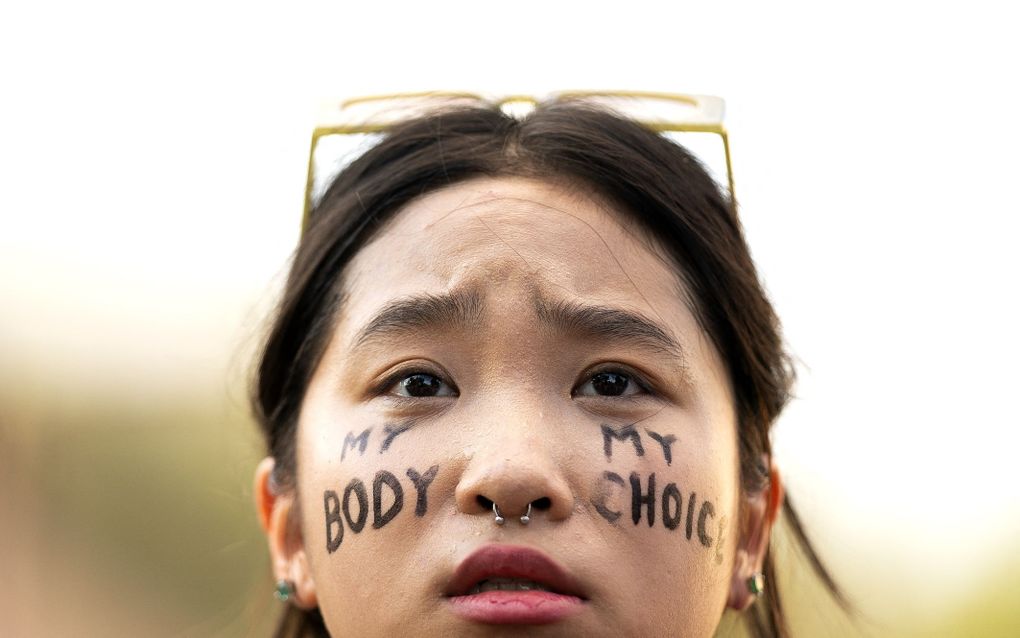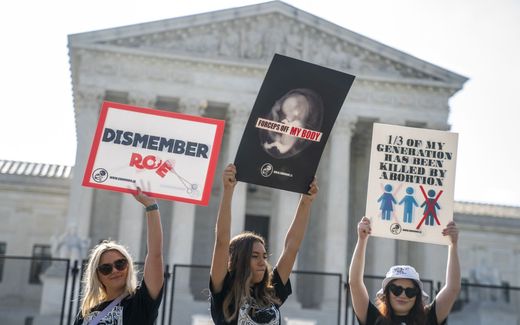European model will be leading for US abortion legislation

Abortion right demonstrator in Washington, last Saturday. Photo AFP, Stefani Reynolds
European Union
The decision by American Supreme Court implies that the United States shift to a European model for abortion legislation. However, enthusiastic pro-Europeans will not value the Court’s decision, because they still hope for a “Roe v Wade”-decision for the EU.
In the European Union, one of the basic rules is that abortion is a member state issue. It is up to the 27 capitals how to handle this issue. Since Friday, this is how the 50 US states will have to manage the termination as well.
On Friday, the Supreme Court decided that abortion is no longer a federal right anymore. The judges overturned the famous decision “Roe versus Wade”, after 49 years of discussion and debate. From 1973, that decision guaranteed that abortion was legal in all American states.
The US will have to handle abortion the same way it deals with capital punishment. At the moment, that is legislated differently from state to state. In the EU, it is just the other way round: abortion is a nation’s matter. But capital punishment in one of the EU member states would be (politically) impossible.
The European Union does not have a Supreme Court that can decide for all members. The European Court of Justice (ECJ) in Luxembourg is the only EU court. But that has only power on strict EU matters. It has nothing to say about the internal policy issues of member states. And the European Court on Human Rights (ECHR) in Strasbourg is not part of the European Union (27 member states) but of the much larger Council of Europe (46 member states).
Europe has a varied landscape
The European tradition of handling abortion as a national matter explains why there are so many differences on the continent. On the one hand, there is Poland, where abortion is almost forbidden. On the other hand, there is Holland, where abortion is seen as a women’s right. In the south, there is Malta, where termination is not possible; in the north, there are the Scandinavian countries, where the rules are very liberal.

European liberals try to underpin abortion as a human (or a women’s) right and as part of primary health care. Earlier this year, the French President Emmanuel Macron pleaded for abortion as part of the EU Charter of Fundamental Rights. Although the European Parliament has expressed itself like this repeatedly, this has never become law yet.
For advocates of an EU-wide abortion rule, “Roe v Wade” was always an example. This guaranteed the right to termination in all corners of the US. And so, there should also be a rule in the EU to give this right to all women once and forever.
On the one hand, this illustrates the global authority of the Supreme Court, which transcends the borders of the US. But on the other hand, this makes evident how great the disappointment is after Friday’s Court’s decision.
For European pro-lifers, the American verdict is an enormous encouragement. They see this as a confirmation that it is possible to overturn an almost 50-year-old decision. In 1973, most European countries still knew no right to abortion.
Abortion remains sensitive
The situation in both the United States and Europe proves that the abortion debate will never really end. Other liberal lifestyle issues, such as divorce, are much less controversial and can be seen as settled. In conservative countries such as Poland and Malta, divorce is possible. And there is no major political force to make this impossible again.
With abortion, this is different. In almost all countries in Europe, there is debate about the margins of the law. In Germany and the Netherlands, recently, there have been detailed changes that appeared to be identity markers for lawmakers on both sides. And in Norway, the government has appointed a committee to review the abortion legislation.
Therefore, it is not wrong to say that termination remains a sensitive and painful matter rather than a settled issue.
Reactions from European leaders
One of the most surprising reactions to the US decision came from the Dutch Christian Democratic leader and Foreign Minister, Wopke Hoekstra. He said in an English tweet: “Today is a reminder that the struggle for the rights of women is never over. The Netherlands stands firmly for the health and rights of all women and girls around the world, to be able to decide about their own bodies and lives.”
Fact is that Hoekstra’s CDA party has always tried to be a bridge between the pro-life and pro-choice movements. A statement like this much more reflects the liberal side of the debate than the conservative. Many Christian Democratic party members responded negatively to Hoekstra’s tweet, suggesting he was voicing other party’s opinions.
The French president Emmanuel Macron tweeted that this decision was “undermining” women’s liberties. “Abortion is a fundamental right for all women. It must be protected. I wish to express my solidarity with the women whose liberties are being undermined by the Supreme Court of the United States.”

Members of Macro’s party have announced they will amend the French Constitution to make abortion a settled right in the country, as is reported by Euractiv.
Also, the British Prime Minister Boris Johnson called it a “big step backwards”. “I have always believed in the woman’s right to decide.”
In Northern Ireland, though, pro-life campaigner Bernie Smyth feels this decision is an encouragement, as reported by the BBC. In the British province, abortion was not decriminalised before October 2019. Smyth: “It’s a bit of a wake-up for us here. There’s a lot to be learnt from what is happening in the US. My personal hope for the future is that we too will one day reverse the legislation. I think the movement in the US has been very wise. This brings a lot of hope, and the battle goes on.”
In Italy, mixed reactions were reported by the BBC. Italy was one of the first countries in Europe to make abortion-on-demand legal in 1978. According to former Foreign Minister Emma Bonino, the US decision shows the possibility of “losing achievements that had seemed permanent.”
According to the Belgian prime minister, Alexander De Croo, the decision will not impact the matter itself. “Prohibiting abortion never leads to fewer abortions, only to more unsafe abortions.”
WHO chief Tedros Adhanom Ghebreyesus showed himself very disappointed. “I had expected that America would protect women’s rights.”
Related Articles






